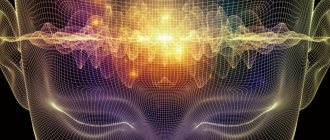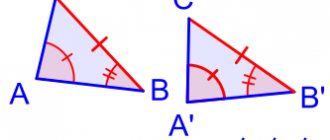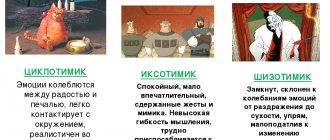Psychologists call character a combination of personality traits that determine its behavior. You can make many lists of human character traits. If two people are given the task of characterizing a third person, their lists will differ from each other. People don't think about how character affects their successes or failures. But, considering the individual qualities that make up character, it is easy to understand how they affect the personality as a whole. A person’s character traits develop depending on the type of nervous activity, heredity, and upbringing environment. They are formed throughout life. The predominance of certain traits determines a person’s lifestyle.
List of qualities
Personality structure includes temperament, volitional qualities, abilities, character, emotions, social attitudes and motivation. And also separately the following qualities:
- Independence;
- Intellectual self-improvement;
- Communication skills;
- Kindness;
- Hard work;
- Honesty;
- Determination;
- Responsibility;
- Respect;
- Confidence;
- Discipline;
- Humanity;
- Mercy;
- Curiosity;
- Objectivity.
A person’s personal qualities consist of internal perception and external manifestations. External manifestation includes a list of indicators:
- innate or acquired artistry;
- attractive appearance and sense of style;
- oratory skills and clear pronunciation of speech;
- a competent and sophisticated approach to non-verbal communication.
The main qualities of a person (her inner world) can be classified according to a number of characteristics:
- a comprehensive assessment of the situation and the absence of conflicting perceptions of information;
- an inherent love for people;
- open-minded thinking;
- positive form of perception;
- wise judgment.
The level of these indicators determines the individual characteristics of the individual being studied.
What kind of character does a person have?
Correct assessment begins with determining what types of character people have. All traits are distributed into five main groups:
Social
It includes traits determined by attitude:
- to yourself;
- labor;
- to society.
Emotional
It includes:
- expressiveness;
- impressionability;
- cheerfulness;
- high and low emotionality;
- impulsiveness;
- impressiveness;
- unstable emotionality.
Strong-willed
It includes:
- focus;
- determination;
- persistence;
- uncertainty;
- courage;
- discipline;
- independence.
Intelligent
It includes:
- prudence;
- depth and flexibility of intelligence;
- resourcefulness;
- mindset (practical or theoretical);
- frivolity;
- intelligence;
- curiosity;
- thoughtfulness.
Moral
It includes the following features:
- rigidity;
- kindness;
- responsiveness;
- honesty and similar qualities.
To compile a psychological portrait, certain qualities are noted.
Structure of individual qualities
To more accurately determine the quality of a person’s personality, one should highlight its biological structure. It consists of 4 levels:
- Temperament, which includes characteristics of genetic predisposition (nervous system).
- The degree of unique mental processes that allows one to determine a person's personal qualities. The level of individual perception, imagination, manifestation of volitional signs, feelings and attention influences the achievement of results.
- The experiences of people, characterized by knowledge, abilities, capabilities and habits.
- Indicators of social orientation, including the subject’s attitude to the external environment. The development of personal qualities acts as a guiding and regulating factor of behavior - interests and views, beliefs and attitudes (state of consciousness based on previous experience, regulating the attitude and behavior of people), moral norms.
The above categories are closely related to the needs and character, abilities and egocentrism of people. The set of general indicators influences the creation of an individual personality shell.
What are the types of temperament?
We figured out what character is. These are personal characteristics of a person that are formed from birth. It is often confused with temperament , although these concepts are far from the same thing.
Temperament is a property of the nervous system: its mobility, responsiveness, stability. This quality of an individual is innate and, unlike character, cannot be changed.
Temperament can be thought of as the basis on which character will subsequently be formed, with the former significantly influencing the latter. Hippocrates wrote about the types of temperament; psychology adheres to his classification to this day:
- melancholic – an anxious person who does not cope well with stress due to a mobile nervous system;
- sanguine – balanced, logical, lively, sociable, optimistic;
- choleric – explosive, impulsive, hot-tempered;
- phlegmatic (who is this?) – a stable, hardy personality type, calm and measured.
Traits of people that characterize their temperament
The innate qualities of a person shape him as a social being. Behavioral factors, type of activity and social circle are taken into account. The category is divided into 4 concepts: sanguine, melancholic, choleric and phlegmatic.
- A sanguine person is a strong and balanced person who easily adapts to a new environment and overcomes obstacles. Sociability, responsiveness, openness, cheerfulness and leadership are the main personality traits.
- A melancholic person is a weak and sedentary person. Under the influence of strong stimuli, behavioral disturbances occur, manifested by a passive attitude towards any activity. Isolation, pessimism, anxiety, tendency to reason and resentment are characteristic features of melancholic people.
- Cholerics are strong, unbalanced, energetic personality traits. They are quick-tempered and unrestrained. Touchiness, impulsiveness, emotionality and instability are clear indicators of a restless temperament.
- A phlegmatic person is a balanced, inert and slow person, not prone to change. Personal indicators show how to easily overcome negative factors. Reliability, goodwill, peacefulness and prudence are the hallmarks of calm people.
List of personality traits
Human nature is a complex combination of unique traits that forms a unique system . This order includes the most striking, stable personal qualities, revealed in gradations of human-society relationships:
| Relationship system | Inherent Traits of an Individual | |
| Pros | Cons | |
| To self | Pickiness | Condescension |
| Self-criticism | Narcissism | |
| Meekness | Boastfulness | |
| Altruism | Egocentrism | |
| To the people around you | Sociability | Closedness |
| Complacency | Callousness | |
| Sincerity | Deceit | |
| Justice | Injustice | |
| Community | Individualism | |
| Sensitivity | Callousness | |
| Courtesy | Shamelessness | |
| To work | Organization | Laxity |
| Mandatory | Cluelessness | |
| Performance | Sloppiness | |
| Enterprise | Inertia | |
| Hard work | Laziness | |
| To items | Economy | Wastefulness |
| Thoroughness | Negligence | |
| Neatness | Negligence | |
In addition to the character traits included by psychologists in the gradation of relationships (as a separate category), manifestations of nature in the moral, temperamental, cognitive and sthenic spheres were highlighted:
- moral: humanity, toughness, sincerity, good nature, patriotism, impartiality, responsiveness;
- temperamental: passion, sensuality, romance, liveliness, receptivity; passion, frivolity;
- intellectual (cognitive): analytical, flexible, inquisitive, resourceful, efficient, critical, thoughtful;
- sthenic (volitional): categoricalness, persistence, obstinacy, stubbornness, determination, timidity, courage, independence.
Many leading psychologists are inclined to believe that some personality traits should be divided into two categories:
- Productive (motivational). Such traits push a person to perform certain actions and actions. These are goal-traits.
- Instrumental. Giving personality during any activity individuality and method (manner) of action. These are methods-traits.
Gradation of character traits according to Allport
Allport's theory
The famous American psychologist Gordon Allport, an expert and developer of gradations of an individual's personal characteristics, divided personality traits into three classes:
Dominant . Such traits most clearly reveal the behavioral form: actions, activities of a certain person. These include: kindness, selfishness, greed, secrecy, gentleness, modesty, greed.
Ordinary . They manifest themselves equally in all numerous areas of human life. These are: humanity, honesty, generosity, arrogance, altruism, egocentrism, cordiality, openness.
Minor . These nuances do not have a particular impact on behavioral reactions. These are not dominant behaviors. These include musicality, poetry, diligence, and diligence.
A strong relationship is formed between a person’s existing personality traits. This pattern forms the final character of the individual.
But any existing structure has its own hierarchy. The human warehouse was no exception. This nuance is traced in Allport's proposed gradation structure, where minor traits can be suppressed by dominant ones. But in order to predict an individual’s actions, it is necessary to focus on the entire set of personality traits .
Individual character traits
Character is a set of individual traits that manifest themselves in different types of activity, communication and relationships with people. The development of personal qualities is formed against the background of life processes and the type of activity of people. To more accurately assess the character of people, behavioral factors in specific circumstances should be studied in detail.
Types of character:
- cycloid – mood swings;
- hyperthymic accentuation consists of high activity and failure to complete tasks;
- asthenic – capricious and depressive personal qualities;
- sensitive – timid personality;
- hysterical - the makings of leadership and vanity;
- dysthymic – focused on the negative side of current events.
Manifestation of character and temperament
A person’s character is not formed instantly, but until old age. The social environment is of great importance. For example, the volitional qualities inherent in a person manifest themselves in emergency situations when endurance, courage, stubbornness, etc. are required.
Emotionality is mental manifestations that arise in certain situations. In this case, feelings can be negative or positive, dynamic or stable, neutral. If we talk about intelligence, then this includes the individual characteristics and quality of thinking of an individual. For example, criticality, stupidity, breadth of soul, flexibility in any relationship, etc.
The character of people greatly influences their perception of the environment. Some consider everyone good or bad, others only themselves. Each person has a certain attitude:
- to oneself (self-esteem, self-criticism, self-respect, etc.);
- labor (punctuality, accuracy, negligence, etc.);
- environment (politeness, isolation, sociability, rudeness, etc.).
As a result, a certain temperament is formed. It includes qualities that are constant for a particular person:
1. Sanguine people are very mobile and efficient, but they quickly get tired of hard work. They have bright facial expressions and strong expressions of emotions. They are sociable, responsive, balanced. They look at everything from a positive point of view and are optimistic. They have a cheerful disposition.
2. Cholerics are characterized by sudden mood swings, hysteria, and impetuosity. They have frequent outbursts of anger, short temper, but quick release.
3. Melancholic people are pessimists, they worry excessively about any reason, and are often in an anxious state. Such people are very distrustful of others, vulnerable, reserved, and have good self-control.
4. Phlegmatic people have very low activity. However, they are very reasonable, cold-blooded and prudent. Any task is always completed.
Separately, it is worth noting that each nationality has its own character traits, although there are many common features. The greatest diversity is among the Russians.
Their character is very different from other nationalities.
Main criteria:
a) Spiritual generosity, which most nationalities do not have. b) Compassion.
c) Craving for justice.
d) Patience, endurance, perseverance.
e) Negative qualities include pessimism, foul language, laziness, hypocrisy. The positive ones are responsiveness, loyalty, compassion, humanity.
Russians are easily distinguished by a combination of character traits, one of which is a special sense of humor, which other nationalities are not always able to understand. The set of qualities is so diverse that most people experience excessive expression of emotions. Some traits may change throughout life. However, other qualities remain unchanged. However, negative traits are not always regarded as negative. Sometimes they emphasize dignity.
For example:
1. Selfishness is not only ignoring other people, but also putting one's own interests first. Such a person has his own opinion and will not follow the lead of others.
2. Self-confidence can improve productivity and performance. Then the person feels self-satisfied, which ultimately brings positive results for society.
3. Envy sometimes pushes a person to work better and achieve the best result.
4. Stubbornness helps you achieve any goals you set.
The character of any person consists of positive and negative qualities. As a result, a certain type is formed. For example, a person can be lazy, but kind and sympathetic. The other is angry, but very hardworking and aspiring. At the same time, women are always more emotional, selfless, good-natured, and patient. Men are most often reserved, decisive, and responsible.
Individual abilities of people
Individual psychological qualities of a person contribute to the achievement of success and excellence in a certain activity. They are determined by the social and historical practice of the individual, the results of the interactions of biological and mental indicators.
There are different levels of ability:
- giftedness;
- talent;
- genius.
The development of the algorithm of personal qualities and abilities of people is characterized by the ability to learn new things in the mental sphere. Special features are manifested in a specific type of activity (musical, artistic, pedagogical, etc.).
Video
Coffee capsule Nescafe Dolce Gusto Chocochino, 3 packs of 16 capsules
1305 ₽ More details
Hot chocolate capsules Nescafe Dolce Gusto Chococino, 8 servings
334 ₽ More details
Gardena hose trolleys
Strong-willed traits of people
Adjusting behavioral factors associated with overcoming internal and external discomfort makes it possible to determine personal qualities: the level of effort and plans for taking actions, concentration in a given direction. Will manifests itself in the following properties:
- willpower - the level of effort to achieve the desired result;
- perseverance – the ability to mobilize to overcome troubles;
- endurance - the ability to limit feelings, thinking and actions.
Courage, self-control, commitment are the personal qualities of strong-willed people. They are classified into simple and complex acts. In a simple case, incentives to action flow into execution automatically. Complex acts are carried out on the basis of motivation, drawing up a plan and taking into account the consequences.
Definition and general characteristics of the concept
Character is a set of stable traits that determine a person’s behavior, his lifestyle, habits, and reactions to various situations. Character is not an innate component of the psyche, but is formed throughout life. The basis for the formation of character is biological characteristics: gender, type of temperament, set of genes. Refracted through the prism of education and individual development, they form a unique psychological picture.
The word “character” translated from Greek means “imprint, seal.” This is what distinguishes a person from other people, makes him unique and inimitable. It is impossible to meet two people with absolutely identical characters.
Character plays a decisive role in our lives. Everything we do, what we think, what emotions we experience is determined by our character. This is a kind of set of patterns fixed in the psyche that are designed to simplify our existence. Imagine: faced with the same situation every time, we would have to re-evaluate it, build a behavior strategy, and analyze the consequences. Character allows you to optimize this process.
Knowing a person's character well, you can almost accurately predict his behavior.
Useful educational materials for girls and women
I will recommend you four of the best women's courses. If you can, go through them all. These programs will help you become a true lady, find a worthy life partner, and learn to achieve success in a variety of areas.
Alpha male: instructions for use
Description. This course is devoted to the rules of building relationships with a man. You will learn how to communicate correctly with a potential partner or with the man with whom you have been married for several years, how not to prevent him from revealing his potential, how to make him a leader, and help him achieve success in a variety of areas.
As the author notes, this course is not only about how to find an alpha male or see him in an “ordinary” man, but also about how to become an alpha female - the one with whom a gorgeous man will be happy to spend his whole life.
I advise you to familiarize yourself with the course, even if you are still very young. Otherwise, there is a high probability that you will stifle the potential of your lover or spend most of your life with a man who is unworthy of you.
Author: Lisa Piterkina.
Cost: 4,500 rub.
Find out more and sign up
School of elite wives: what men are silent about
Description. From this course you will learn about the features of male psychology, about its fundamental differences from the psychology of women. You will understand how guys choose girls for themselves, what is really important to them, how to “pick up” a cool guy or a mature man at any age and with absolutely any appearance.
Lisa Piterkina also dwells in detail on men's fears - on what they never tell their women about. If you understand this side of your lover’s personality and accept him for who he is, your love will truly be unbreakable.
There are two blocks in the course. The first of them is represented by a video lasting 45 minutes. It's free - download and watch it now.
Author: Lisa Piterkina.
Cost: the first part is free, the second – 3,000 rubles.
Sexual secrets of women who are never abandoned
Description . In this course, Lisa Piterkina explains to girls and women why men start looking for relationships on the side. As it turns out, it’s usually not just a matter of “men are so bad.” It’s just that a relationship with a former lover does not bring happiness to a man. And it’s not age, everyday life or any other external factors that are to blame for this.
The teacher will tell you how to always remain desirable to a man, how to never cease to amaze him. If you are young, you may think that this course is not particularly important for you, but believe me, it is not. It’s better to avoid annoying mistakes right away than to madly regret them in the future.
Author : Lisa Piterkina.
Cost : 3,000 rubles.
Find out more and sign up
Women's magic from Yulia Pryakhina
Description . The course is equally suitable for girls and women of all ages; the stage of the relationship does not matter. You will master intimate skills to perfection and learn to understand your man much better. Yulia Pryakhina will explain how to build the right emotional background in a relationship, how not to let everyday life stifle passion, how to constantly experience the happiness of being loved.
I especially recommend this course to those girls who, for various reasons, feel insecure, embarrassed about their body, and don’t know how to properly build a relationship with a handsome and confident guy.
Author : Yulia Pryakhina.
Cost : 3,500 rubles.
Find out more and sign up
What is character accentuation
Accentuation is an extreme degree of expression of some specific character traits. A person with accentuation of character is mentally healthy, but on the very border of the norm.
Under unfavorable conditions, accentuation can develop into a mental disorder, leading to alcoholism, drug addiction, deviant behavior and suicide.
Accentuations are most common among teenagers. According to statistics, 95% of boys and girls aged 14–17 years have sharpened, hypertrophied character traits. With age, this figure decreases to 60%.
Accentuations cause personality disharmony, complicate socialization and general adaptation, and reduce productivity in all areas of life. The formation of accentuation is influenced by both hereditary factors and upbringing.
The ability to forgive
Even a beautiful woman can lose her attractiveness in men's eyes when she has a bad temper. Why are guys attracted to the ability to forgive in girls? Mistakes are inevitable on the path of life, but often in a couple they lead to conflicts, resentments or misunderstandings.
In the book “Love alone is not enough. 12 questions to answer before you decide to marry,” writer Gary Chapman writes that major or minor grievances erect an emotional barrier between lovers, which contributes to the separation of partners. It is impossible to destroy this obstacle by demands for justice, reproaches or moralizing. Only sincere forgiveness will help improve relationships.
Forgiveness is a decision to reconcile, which opens the way for the harmonious development of relationships. It does not take away the pain, it does not remove unpleasant memories, but it becomes the first step towards restoring trust, understanding and love.











